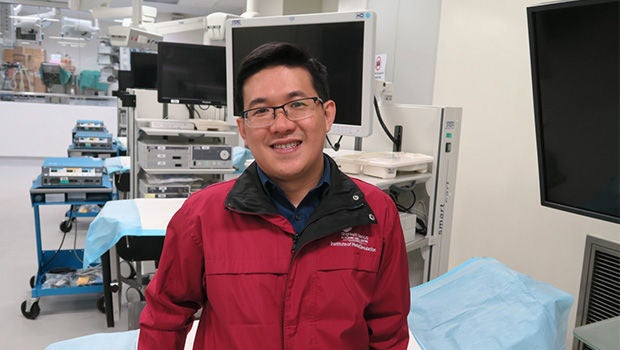
By Alvin Chumari
Mention the word ‘mentors’ and we typically think of respected seniors or peers that teach and guide us in our work or daily lives. But do you know that one can learn just as much from mentors who do not speak a single word?
Ask Zayar Min, Assistant Manager at the SingHealth Duke-NUS Institute of Medical Simulation (SIMS), located at Academia’s basement. “A ‘Silent Mentor’ is a respectful term used to refer to individuals who donate their bodies after they pass on for medical training and research,” said Min. “They are crucial in helping us understand the complex anatomy of a human body during surgical skills training.”
At SIMS, our ‘Silent Mentors’ are from Singapore and the US, and most of them elderly. They are housed separately in freezers with temperatures ranging from -20°C to 4°C. Being one of the largest simulation labs in the region, SIMS has the capacity to house up to 33 ‘Silent Mentors’ at a time.
Treated with as much respect as the living
A typical day for Min and his team mates - Clinical Lab Assistants Raju Karthikeyan, Rey Brillantes Barce and Ahmeer Khan, as well as Anatomy Technologist Willy Damawan starts with preparing the materials required for classes scheduled that day. This includes preparation of lab supplies, surgical instruments, medical equipment, as well as preparing the ‘Silent Mentors’, animal tissues or appropriate simulated models required for each class.
“Before the commencement of each training session and with the trainer’s permission, a few words of appreciation are shared with the ‘Silent Mentors’ for their incredible sacrifice, followed by a moment of silence,” said Min. “They are treated with as much respect as the living.”
Needless to say, taking photos and videos with the ‘Silent Mentors’ is not allowed, unless for academic purposes where prior permission must be sought. If the training is to be captured, the “Silent Mentor” must not be identifiable from the photos or video taken. “Even areas of the body that are not relevant to the training are to remain covered at all times,” added Min.
For classes that span a few months, healthcare professionals and students will typically work with the same “Silent Mentor” who may be kept for up to two years – a practice that is common among all anatomy labs.
“When the ‘Silent Mentors’ have taught us all that they could, they are placed respectfully in a casket. A donor memorial session is held for them, and thereafter, they are sent by hearse for cremation at the Choa Chu Kang Crematorium,” said Min.
Fascination with human anatomy
Although Min has been in this role in SingHealth for the past 7 years, he’s known ‘Silent Mentors’ for much longer – since his university days as a medical student and as an anatomy tutor back in his home country of Myanmar.
“I have always been fascinated with human anatomy and so applied for a teaching position in university. After being a tutor for two and a half years, I was offered the opportunity to run an anatomy lab,” shared Min. From then on, Min has been involved with managing anatomy labs.
He recalled one of the challenges he faced when he was asked to help with the design of the new SIMS lab when it was to be moved to Academia from its previous location above SGH mortuary (Block 9).
“The presence of odours is always a concern for wet labs and anatomy labs. To overcome this challenge for the new lab, we had to tackle it from various fronts such as the use of a specialised airflow management system, commitment from staff to keep everything very clean and contained, even the methods used to preserve cadavers had to be carefully considered,” explained Min.
Today’s SIMS lab in Academia is a state-of-art facility that is able to accommodate up to 20 full-body tables or up to 50 procedural trainings at a time – two times more than what could be offered in the previous lab.
His somewhat unconventional career choice has sparked questions from his relatives and friends in the past. To that, Min replied confidently, “ ‘Silent Mentors’ are truly invaluable in medical science and I am honoured to work with them. Being able to help with the training of next generation of healthcare professionals is something my team and I will always be proud of.”
Credit
Some parts of this story have been inspired and adapted from “The Silent Mentors” by SGH Lighternotes.













 Get it on Google Play
Get it on Google Play